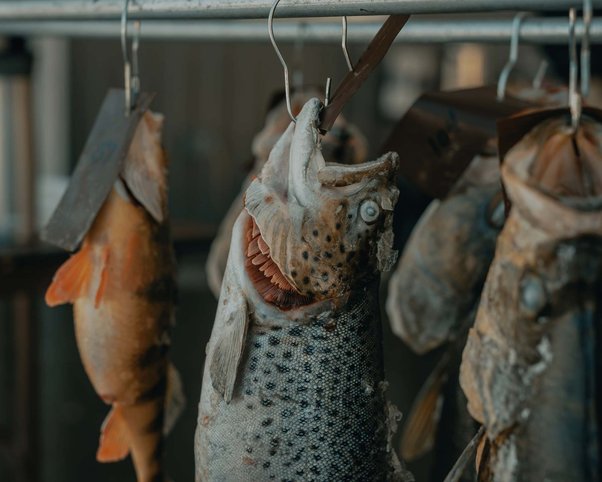Do Fish feel pain when hooked? Research says, yes!

Do Fish feel pain when hooked – While many people consider fish to be simple creatures that swim around without much purpose or intelligence, it is important to note that they are far more complex than we often give them credit for. One aspect of this complexity is that fish have pain receptors and a nervous system, just like many other animals.
This means that they are capable of experiencing pain and suffering in response to harmful stimuli, such as fishing hooks, nets, and other sources of injury or stress. Understanding fish’s cognitive and sensory abilities can help us develop more humane and sustainable ways of interacting with them while enriching our appreciation of these fascinating and important creatures.
Do fish feel pain when hooked?
It’s common to see people fishing by the side of a river or at sea, seemingly unaware of the pain they might be inflicting on the creatures they are trying to catch. While many people might assume that fish are mindless creatures and, therefore, unable to feel pain, this is a highly contested notion challenged by scientific evidence.
Research has shown that fish have pain receptors and a nervous system, just like other animals, which means that they are capable of experiencing pain in response to harmful stimuli. When a fish is hooked, it may struggle and fight for its life, trying to escape the pain and fear that it is experiencing. The stress of being caught can also cause physiological changes in the fish’s body, leading to increased heart rate, changes in respiration, and other signs of distress.
It is a heartbreaking reality that fishing can cause immense suffering to the fish being caught. Unfortunately, fishing practices often involve hooks and other equipment that can cause severe injuries and pain to the fish.
Even if a fish is released back into the water after being caught, the experience can leave it traumatized and injured, with long-term effects on its health and well-being. It’s important to recognize the pain and suffering that fish may experience and to consider more humane and sustainable ways of interacting with these creatures, such as catch-and-release methods that minimize harm to the fish.
Do fish feel pain when they are suffocated?
It is distressing to consider that fish may experience pain and suffering when they are suffocating. When fish are taken out of the water, they are deprived of the oxygen needed to survive, which can lead to suffocation and other forms of distress.
Research has shown that fish have pain receptors and a nervous system, which means that they are capable of experiencing pain in response to harmful stimuli. The stress and trauma of being caught and removed from their natural environment can also negatively impact their health and well-being, potentially causing long-term harm.
It is sad that catching and killing fish for human consumption can cause immense suffering to these creatures. While it may be difficult to imagine the experiences of fish, it is important to acknowledge their sentience and to consider more humane and sustainable ways of interacting with them. Treating fish with respect and compassion can reduce their pain and suffering and contribute to a more ethical and responsible approach to fishing and seafood consumption.
Evidence to support the statement, “Do fish feel pain when hooked”
Evidence suggests that fish are capable of experiencing pain, and this has important implications for how we treat them. Here are some of the key factors that contribute to our understanding of fish pain:
- Peripheral nervous system: Fish have a peripheral nervous system with sensory receptors throughout their bodies. These receptors respond to stimuli such as heat, pressure, and injury.
- Receptors: Fish have specialized receptors that detect noxious stimuli or those that cause tissue damage. These receptors are similar to those found in other animals and are responsible for initiating a pain response.
- Nerve fibers: Fish also have nerve fibers that transmit pain signals from the injury site or stimulate the central nervous system.
- Central nervous system: Fish have a central nervous system that includes a brain and spinal cord. This system processes the pain signals received from the peripheral nervous system.
- Brain: Fish have a brain responsible for processing sensory information, including pain. Studies have shown that fish have brain regions activated in response to noxious stimuli, suggesting that they experience pain similar to other animals.
- Opioid system: Fish also have an opioid system, which is involved in pain modulation. This system is similar to that found in other animals and reduces pain signals in response to stress and injury.
Together, these factors provide strong evidence that fish are capable of experiencing pain. While it is difficult to fully understand the subjective experience of fish, their complex nervous systems and responses to noxious stimuli suggest that they can suffer. This has important implications for interacting with fish and other aquatic animals and highlights the need for more humane and sustainable fishing practices.
Wrapping Up
In conclusion, the evidence strongly suggests that fish are capable of experiencing pain, and it is important that we acknowledge and address this issue. By recognizing the sentience and complexity of fish, we can develop more ethical and sustainable approaches to fishing and seafood consumption and reduce the suffering of these important creatures.
Raising awareness about fish pain and promoting the humane treatment of fish can help build a more compassionate and responsible relationship with the natural world. Whether through education, advocacy, or individual action, we can all promote greater awareness and respect for the welfare of fish and other aquatic animals.
Frequently Asked Questions (FAQs):
- Do fish feel pain when they are hooked?
Yes, research suggests that fish have pain receptors and a nervous system and are capable of experiencing pain in response to harmful stimuli, such as being hooked. - Can fish recover from being caught and released?
While some fish may recover from being caught and released, the experience can leave them traumatized and injured, with long-term effects on their health and well-being. - Is catch-and-release fishing more humane?
Catch-and-release fishing can be a more humane approach to fishing, as it minimizes harm to the fish and allows them to be returned to their natural environment. - What are some ways to reduce the pain of fish when fishing?
Some ways to reduce the pain of fish when fishing include using barbless hooks, handling them gently and quickly, and releasing them as soon as possible. - Why is it important to recognize fish pain?
Recognizing fish pain is important for promoting more ethical and sustainable fishing practices and for building a more compassionate and responsible relationship with the natural world.
- The Future of Home Entrances: Innovations in Composite Doors
- What Happens to Royalties After You Die
- Exploring the Transformative Impact of the Intranet in Empowering Small Businesses
- Is It Entirely Unlawful To Gamble Online In The US
- Here Are Some Of The Most Common Contaminants Your Car Encounters During The Winter






